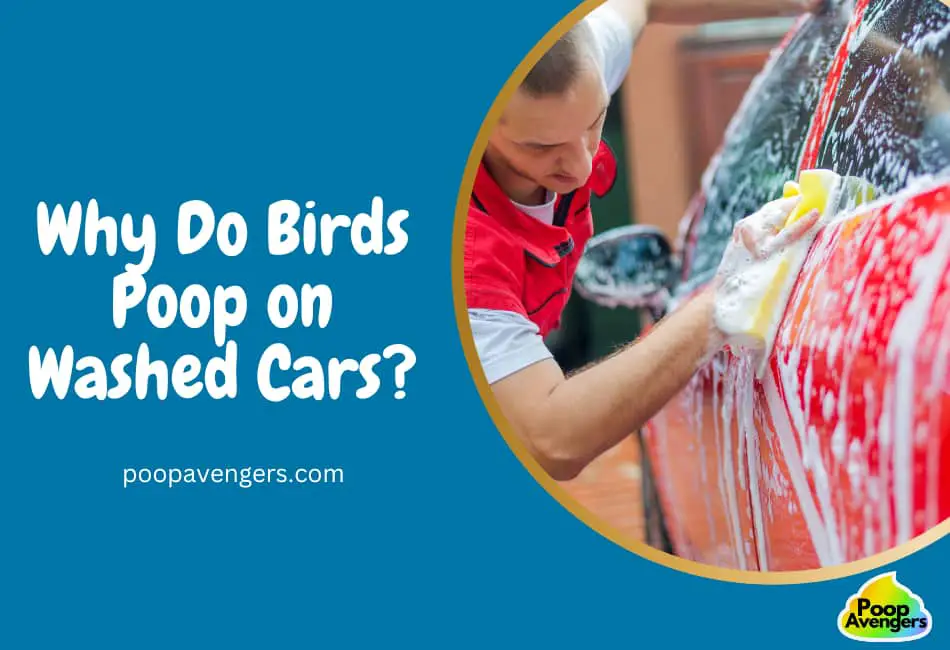It’s a scenario I’ve experienced one too many times: I wash my car, it’s gleaming in the sunlight, and then, out of nowhere, a bird makes its mark.
It almost feels like they’re waiting for that perfect shine before they swoop in! But why does this happen? Is there a method to their madness, or is it sheer coincidence?
I’ll examine why birds poop on our clean cars. I’ll explore how birds live and see the world, which might help us understand this odd behavior. So, let’s get started on this fun journey together!
Why Birds Poop on Washed Cars – 5 Biological Reasons
Birds have a tendency to target our freshly washed cars, leaving streaks of waste on our hard work in a matter of moments. But why do they do this?
1. Regular Excretion
As I’ve learned, birds have a unique digestive system that’s quite different from ours as mammals. They digest food so quickly that they excrete waste almost immediately after eating.
Because of this regular excretion, the chances of a bird pooping on my washed car might be a matter of timing. It’s not that they’re aiming for it – it’s simply part of their daily routine.
2. Lack of Control
Birds don’t have the same control over their bodily functions that we do. They can’t hold in their poop like we can when we need to go to the bathroom. Instead, they relieve themselves automatically whenever it’s necessary.
This means they could be flying over my freshly cleaned car, and suddenly, nature calls. Their lack of control makes bird droppings on clean cars a more common occurrence.
3. High Metabolism
Birds’ small size and the energy they use during flight lead to a very high metabolic rate. This faster metabolism means they digest food quicker and excrete waste more often.
So, the more frequently a bird needs to relieve itself, the higher the chance my shiny car will end up with a surprise from above. The cleanliness of the car doesn’t matter to the bird – it’s all about where they are when they need to go.
4. Territorial Marking
Some species of birds claim their territory by leaving their droppings on it. When my car is freshly washed and gleaming, it might look like a new object to a bird. This could lead them to poop on it to mark this ‘new’ territory. It might seem like they’re targeting my car, but it’s really just part of their instinct to protect their space.
5. Reflection Attraction
I’ve noticed that birds are often attracted to shiny things, and a clean car certainly shines. The reflection from a washed car can attract birds, causing them to perch or fly nearby.
While they’re there, they might naturally need to poop. It’s not a biological reason per se, but it connects back to their inherent behaviors and perceptions. So, the shinier my car, the more likely it might attract a bird…and its droppings.
These explanations show that birds aren’t purposefully targeting my washed car. Rather, combining their natural biological functions and behaviors results in these messy situations.
Bird Perception: Why Clean Cars Attract Our Feathered Friends
Attraction to Washed Cars:
Birds, especially those with keen eyesight like pigeons and crows, may be attracted to the reflective surface of a washed car. The freshly cleaned car provides a shiny, mirror-like surface that can catch a bird’s attention from above.
It’s not that they’re deliberately choosing to poop on clean cars; it’s more about what grabs their attention in their environment.
A shiny car stands out, making it a noticeable landmark for birds flying overhead. This increased visibility could inadvertently make washed cars more prone to bird droppings.
Contrast with Surroundings
The contrast between a gleaming, clean car and its surroundings can make it more noticeable to birds. Imagine looking down from a bird’s-eye view – a shiny object is likely to stand out from the duller colors of the road or driveway.
This stark contrast can draw birds towards the car, whether to investigate, perch, or mark their territory. While there, they may naturally relieve themselves, leading to more droppings on washed cars. It’s not intentional targeting but rather the result of perceptual factors.
Association with Water Sources
Another intriguing theory revolves around the potential association between shiny surfaces and water sources in a bird’s perception. Birds often see bodies of water reflecting sunlight from high above.
A freshly washed car might mimic this visual cue with its reflective surface, leading birds to mistake the car for a water source.
As they approach or fly over what they believe to be water, they may poop, as they often do when near water bodies. This misperception could explain why clean cars seem to attract more bird droppings.
How Surroundings Impact Bird Activity Around Clean Cars
Influence of Habitat Proximity on Bird Behavior
The proximity of a bird’s habitat to where we park our cars can significantly influence bird behavior and, consequently, the likelihood of bird droppings on our vehicles.
Birds tend to spend a lot of time in and around their habitats. If these habitats are near where we typically park our washed cars;
- say, under a tree or close to a building with nesting birds
- it’s likely that our cars will receive more than their fair share of bird droppings.
Not because the birds are targeting the cars but because of their normal activity.
Availability of Perches Near Washed Cars
The presence of perches or resting spots near where we park our washed cars can also increase the chances of bird droppings. Birds often relieve themselves before taking off from a perch.
If they’ve chosen a tree or a ledge close to our clean cars as their resting spot, there’s a higher chance they’ll leave a parting gift on the car when they fly away. It’s not an intentional act against the car but a byproduct of where they choose to rest.
Presence of Food Sources or Water Nearby
The availability of food sources or water near where we park our clean cars can also result in increased bird activity in the area. Birds tend to congregate where food and water are readily available.
If these sources are near our parked cars, the likelihood of bird droppings on the vehicles increases. It’s not that the birds are aiming for the cars; they’re just going about their normal feeding and drinking activities, including regular digestive system relief.
These environmental factors show that the ‘targeting’ of washed cars by birds is often less about the vehicle’s cleanliness and more about the birds’ normal behaviors in relation to their environment.
Practical Solutions to Minimize Bird Droppings on Washed Cars
Preventive Tips for Car Owners
Car owners can take several steps to reduce the likelihood of bird droppings on their freshly washed cars. Regularly cleaning the areas around your parking spot, especially removing any food debris or waste, can help discourage birds from gathering.
Another tip is to avoid parking under trees or near bird nests, as these are places where birds frequently perch and relieve themselves.
Use of Car Covers and Sheltered Parking
Using a car cover after washing your vehicle is a simple yet effective solution. The cover protects the car from droppings, and its non-reflective surface might be less attractive to birds.
Alternatively, parking in a garage or other sheltered area can also help protect your car. Even if birds are attracted to the area, a physical barrier between them and your vehicle will prevent any droppings from reaching your clean car.
Scare Tactics and Deterrents:
Some car owners have found success in using scare tactics or deterrents. Fake owls or hawks, known predators of smaller birds, can be effective in scaring away potential droppers.
Wind chimes or other noise-making devices can also deter birds. If all else fails, some companies sell bird-repellent sprays that are safe for cars.
These sprays create a smell that’s unpleasant to birds but harmless to humans, making your car a less appealing target. Remember that these solutions may not work for all bird species and situations.
Conclusion
In conclusion, the perception that birds have a vendetta against our freshly washed cars is largely due to a mixture of environmental factors and bird behavior rather than any malicious intent on the part of our feathered friends.
The proximity of their habitats, the availability of perches near our vehicles, and the presence of food or water sources can all increase bird activity around our cars, leading to the inevitable droppings.
While this can be frustrating for car owners, understanding these factors can help us devise effective strategies to minimize the impact.
There are several ways to protect your shiny, clean car from the avian onslaught, from using car covers to employing scare tactics. So, the next time you wash your car, remember these tips to keep it sparkling clean for longer.

